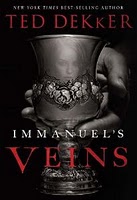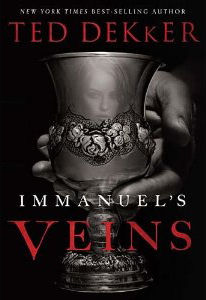
by Jason Joyner | Oct 5, 2010 | Blog, boundaries, CBA, christian fiction, Immanuel's Veins, Ted Dekker
File this post under “unfinished business.”
On September 15th I reviewed Immanuel’s Veins by Ted Dekker for the CFBA tour. I made the
comment, “Is this the book that changes what Christian fiction can be about?” I left off a cliffhanger saying I’d discuss it “tomorrow.”
Hope you haven’t been hanging too long!
Still, I don’t want to let this idea go. Immanuel’s Veins is a book that deserves some analysis.
The book is a potent mix of visual and emotional imagery. As I said in my review, Dekker spends time developing his two main characters, Toma and Lucine, and otherwise has placeholder characters that allow him to develop the tension and force the plot on its blistering pace. As Toma falls for Lucine, and she is torn between him and a deceptively dashing royal, there is a lot of description of the desire that develops.
Dekker describes it as probably “the most Christian book I’ve ever written.” It certainly is laced with the love Jesus has for His bride, as well as a deep connection to the Song of Solomon (he dedicates the book to King Solomon) and other Biblical imagery such as the two sisters in Ezekiel who end up whoring after other countries and their false gods. To build such a premise, this book couldn’t really be tame.
Dekker writes freely of passion and desire in building up the drama. The story wouldn’t have worked without it. The sensuality of the followers of van Valerik is contrasted with the nobility of Toma and Lucine. Still, both of them are tempted by the opportunity, and Lucine is seduced by Duke Vlad van Valerik. The horror of what she encounters after she gives herself to him echoes the mistake people make when they go after the schemes of Satan, only to realize they’ve been snared.
The book is sensual. The story demands it. As I read it, sometimes it was slightly arousing. It is unlike any other Christian (CBA) novel I’ve read. The book was actually not accepted by Ted’s Christian publisher in Holland due to its sensuality (can you say irony?).
I think only someone with Dekker’s clout in the CBA industry could get away with writing this book. Violence has long been accepted in Christian fiction, but any kind of sexuality is resisted. Now, I don’t think we should be seeing “Christian erotica” anytime soon, and that is not the purpose of Immanuel’s Veins. Again I’ll say the story required such language.
So this book could be a book that changes Christian fiction. I don’t think we’ll be seeing smut in the CBA, but if there is a proper place for sexual/sensual language that serves the story and the message, then Immanuel’s Veins sets a precedent. It will be resisted by some for sure – on the Amazon page the book is overwhelmingly praised, but there are several 1 star reviews that decry the language and imagery. I see their point, but I feel those reviewers are missing the point of the book by focusing on the trees and missing the forest.
Will this open up Christian fiction to the idea that “the end justifies the means?” I don’t think that is the case here. But Dekker really is not forging new ground, not when prophets and wise men in the Bible used such imagery first. Time will tell if it pushes CBA fiction, or if it is an isolated case.
What say you?
—

by Jason Joyner | Oct 5, 2010 | Blog, boundaries, CBA, christian fiction, Immanuel's Veins, Ted Dekker
File this post under “unfinished business.”
On September 15th I reviewed Immanuel’s Veins by Ted Dekker for the CFBA tour. I made the
comment, “Is this the book that changes what Christian fiction can be about?” I left off a cliffhanger saying I’d discuss it “tomorrow.”
Hope you haven’t been hanging too long!
Still, I don’t want to let this idea go. Immanuel’s Veins is a book that deserves some analysis.
The book is a potent mix of visual and emotional imagery. As I said in my review, Dekker spends time developing his two main characters, Toma and Lucine, and otherwise has placeholder characters that allow him to develop the tension and force the plot on its blistering pace. As Toma falls for Lucine, and she is torn between him and a deceptively dashing royal, there is a lot of description of the desire that develops.
Dekker describes it as probably “the most Christian book I’ve ever written.” It certainly is laced with the love Jesus has for His bride, as well as a deep connection to the Song of Solomon (he dedicates the book to King Solomon) and other Biblical imagery such as the two sisters in Ezekiel who end up whoring after other countries and their false gods. To build such a premise, this book couldn’t really be tame.
Dekker writes freely of passion and desire in building up the drama. The story wouldn’t have worked without it. The sensuality of the followers of van Valerik is contrasted with the nobility of Toma and Lucine. Still, both of them are tempted by the opportunity, and Lucine is seduced by Duke Vlad van Valerik. The horror of what she encounters after she gives herself to him echoes the mistake people make when they go after the schemes of Satan, only to realize they’ve been snared.
The book is sensual. The story demands it. As I read it, sometimes it was slightly arousing. It is unlike any other Christian (CBA) novel I’ve read. The book was actually not accepted by Ted’s Christian publisher in Holland due to its sensuality (can you say irony?).
I think only someone with Dekker’s clout in the CBA industry could get away with writing this book. Violence has long been accepted in Christian fiction, but any kind of sexuality is resisted. Now, I don’t think we should be seeing “Christian erotica” anytime soon, and that is not the purpose of Immanuel’s Veins. Again I’ll say the story required such language.
So this book could be a book that changes Christian fiction. I don’t think we’ll be seeing smut in the CBA, but if there is a proper place for sexual/sensual language that serves the story and the message, then Immanuel’s Veins sets a precedent. It will be resisted by some for sure – on the Amazon page the book is overwhelmingly praised, but there are several 1 star reviews that decry the language and imagery. I see their point, but I feel those reviewers are missing the point of the book by focusing on the trees and missing the forest.
Will this open up Christian fiction to the idea that “the end justifies the means?” I don’t think that is the case here. But Dekker really is not forging new ground, not when prophets and wise men in the Bible used such imagery first. Time will tell if it pushes CBA fiction, or if it is an isolated case.
What say you?
—

by Jason Joyner | Sep 15, 2010 | Blog, CFBA, fiction, reviews, suspense, Ted Dekker
Read on below, to find out about a free giveaway contest!
This week, the CFBA Tour is featuring the latest thriller from Ted Dekker:
Is this the book that changes what Christian fiction can be about? First, the concept:
It is set in Eastern Europe in 1772, a time of war between the Russian and Turkish empires. The small principality of Moldova, neighbor to Transylvania, is wedged between these two powers, and is a strategic interest.
The empress Catherine the Great sends one of her best soldiers, Toma Nicolescu, to guard over the Cantemir estate. This noble family holds the key to politics in this critical area. It is ruled over by the matriarch Kesia Cantemir, and her twin daughters Natasha and Lucine.
Toma enters this world just as a neighboring duke begins to make his presence known to the Cantemirs. The dashing Vlad van Valerik has his sights on one of the Cantemir twins. But Toma has been smitten by one of the beauties as well.
As passions intertwine, a torrid love story bursts forth. Evil seduces. Death will be known. Love will bloom. And as the back copy says, “Blood will flow.”
—
Ted Dekker is one of the most imaginative writers in CBA fiction today. He writes taut suspense that seldom fails to grip the reader until the last page. He takes chances, and Immanuel’s Veins is a bold thrust against some of the prevailing themes in popular fiction right now.
Dekker will not win over the literati with this novel. This book has a strong idea, and it pushes that idea relentlessly. The two main characters are noble but flawed, and their choices have consequences. Other characters serve the plot, and are not fully fleshed out. In other books, this would bother me. In Immanuel’s Veins, this almost seems necessary, as it is a love affair between two people, in the best sense of the phrase.
It certainly is a sensual book. Dekker dedicates it to King Solomon, he who is often thought to be the author of the Biblical Song of Solomon. He doesn’t hold back in driving home the emotion. He doesn’t titillate, but some may not be able to handle the force he uses to write this book.
Some are saying this is Ted Dekker’s version of a vampire story. I suppose you could say that. Perhaps you should check it out for yourself.
The end point: I am a fan of Dekker’s, but not every book of his is a home run. Immanuel’s Veins is unique in his bibliography, and it is a significant contribution to what fiction can do. I enjoyed it, and I ponder it still. It certainly gets the blood pumping, and it may just be my favorite Dekker book.
He asks the question “what is sacrificial love?” It is a novel written to address that one idea. In conjuction with it, I wrote about it yesterday.
And what did I mean by “Is this the book that changes what Christian fiction can be about?”
Well it seems I’m out of time for today ;). Check back tomorrow for that thought.
And I promised a giveaway! One person who comments on this post will be chosen at random to win a special t-shirt designed by Dekker’s publisher to help share the message “spread the love”. It is a cool T, and I think you’ll like it! Leave a comment, and I’ll choose a winner by Monday, Sept 20.

by Jason Joyner | Sep 15, 2010 | Blog, CFBA, fiction, reviews, suspense, Ted Dekker
Read on below, to find out about a free giveaway contest!
This week, the CFBA Tour is featuring the latest thriller from Ted Dekker:
Is this the book that changes what Christian fiction can be about? First, the concept:
It is set in Eastern Europe in 1772, a time of war between the Russian and Turkish empires. The small principality of Moldova, neighbor to Transylvania, is wedged between these two powers, and is a strategic interest.
The empress Catherine the Great sends one of her best soldiers, Toma Nicolescu, to guard over the Cantemir estate. This noble family holds the key to politics in this critical area. It is ruled over by the matriarch Kesia Cantemir, and her twin daughters Natasha and Lucine.
Toma enters this world just as a neighboring duke begins to make his presence known to the Cantemirs. The dashing Vlad van Valerik has his sights on one of the Cantemir twins. But Toma has been smitten by one of the beauties as well.
As passions intertwine, a torrid love story bursts forth. Evil seduces. Death will be known. Love will bloom. And as the back copy says, “Blood will flow.”
—
Ted Dekker is one of the most imaginative writers in CBA fiction today. He writes taut suspense that seldom fails to grip the reader until the last page. He takes chances, and Immanuel’s Veins is a bold thrust against some of the prevailing themes in popular fiction right now.
Dekker will not win over the literati with this novel. This book has a strong idea, and it pushes that idea relentlessly. The two main characters are noble but flawed, and their choices have consequences. Other characters serve the plot, and are not fully fleshed out. In other books, this would bother me. In Immanuel’s Veins, this almost seems necessary, as it is a love affair between two people, in the best sense of the phrase.
It certainly is a sensual book. Dekker dedicates it to King Solomon, he who is often thought to be the author of the Biblical Song of Solomon. He doesn’t hold back in driving home the emotion. He doesn’t titillate, but some may not be able to handle the force he uses to write this book.
Some are saying this is Ted Dekker’s version of a vampire story. I suppose you could say that. Perhaps you should check it out for yourself.
The end point: I am a fan of Dekker’s, but not every book of his is a home run. Immanuel’s Veins is unique in his bibliography, and it is a significant contribution to what fiction can do. I enjoyed it, and I ponder it still. It certainly gets the blood pumping, and it may just be my favorite Dekker book.
He asks the question “what is sacrificial love?” It is a novel written to address that one idea. In conjuction with it, I wrote about it yesterday.
And what did I mean by “Is this the book that changes what Christian fiction can be about?”
Well it seems I’m out of time for today ;). Check back tomorrow for that thought.
And I promised a giveaway! One person who comments on this post will be chosen at random to win a special t-shirt designed by Dekker’s publisher to help share the message “spread the love”. It is a cool T, and I think you’ll like it! Leave a comment, and I’ll choose a winner by Monday, Sept 20.
by Jason Joyner | Sep 14, 2010 | Blog, love, sacrifice, Ted Dekker
I was asked to consider this question recently:
What is sacrificial love?
A deep question. How does one respond?
Do I love my wife with a sacrificial love? If I think hard about it, probably not for the most part. I’m selfish. I do things to my advantage a lot of times. I’m not saying I don’t love her. I love her dearly, deeply, almost desperately. I would like to think I do. But often I am not at the level of true sacrifice. I do things for her that I would otherwise not do, but I don’t know how much of a “sacrifice” they are.
My kids? I would sacrifice myself for them if there was a choice of them living or me living. I would throw myself in front of a car to save them. But here also, I often do things for myself, and not for the best of my children. I could make a deeper choice. Instead of taking Thursday nights to relax for myself, I could spend quality time with them, but that is not my habit.
As a Christian, the highest ideal is sacrificial love. Jesus gave His life, His very blood for us. It drained out of His body, stained the ground beneath the cross, all to wash away my sins. Your sins.
I find it is a very hard thing to live up to that example.
What say you? What thoughts do you have about what sacrificial love is? I really would like your input on this.
—
by Jason Joyner | Sep 14, 2010 | Blog, love, sacrifice, Ted Dekker
I was asked to consider this question recently:
What is sacrificial love?
A deep question. How does one respond?
Do I love my wife with a sacrificial love? If I think hard about it, probably not for the most part. I’m selfish. I do things to my advantage a lot of times. I’m not saying I don’t love her. I love her dearly, deeply, almost desperately. I would like to think I do. But often I am not at the level of true sacrifice. I do things for her that I would otherwise not do, but I don’t know how much of a “sacrifice” they are.
My kids? I would sacrifice myself for them if there was a choice of them living or me living. I would throw myself in front of a car to save them. But here also, I often do things for myself, and not for the best of my children. I could make a deeper choice. Instead of taking Thursday nights to relax for myself, I could spend quality time with them, but that is not my habit.
As a Christian, the highest ideal is sacrificial love. Jesus gave His life, His very blood for us. It drained out of His body, stained the ground beneath the cross, all to wash away my sins. Your sins.
I find it is a very hard thing to live up to that example.
What say you? What thoughts do you have about what sacrificial love is? I really would like your input on this.
—


